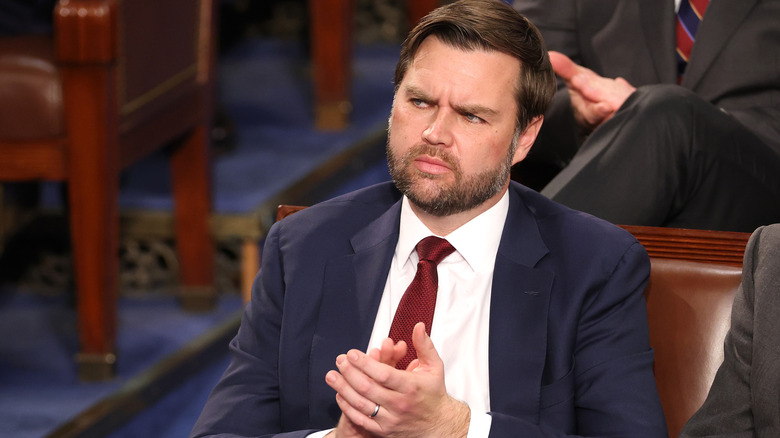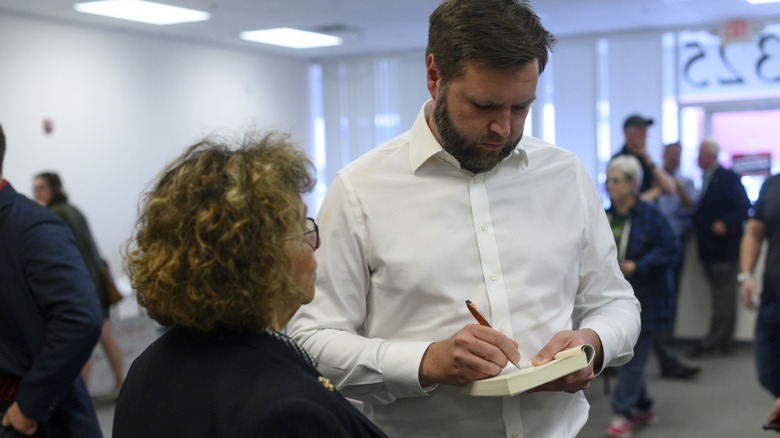All Of The Controversy Surrounding JD Vance's Hillbilly Elegy
JD Vance's 2016 book "Hillbilly Elegy: A Memoir of a Family and Culture in Crisis" tells the real-life story of his Appalachian upbringing and going from rags to riches in rural Ohio. The vice president's memoir took America by storm, selling around 3 million copies as of 2024. He started off in poverty and climbed up to Yale Law — an inspiring story for many. However, controversy quickly sparked among fellow residents of Appalachia. (Even Vance's cousin didn't mince words while criticizing him and his book.)
Their main concern is how they are portrayed in the book. Vance focuses on one of the community's main struggles, poverty — rural Appalachia's median household income, after all, is significantly lower than that of household incomes in other rural areas in the U.S. (per Appalachian Regional Commission). However, he attributes these financial struggles to personal decisions. "We choose not to work when we should be looking for jobs," Vance wrote (via The Washington Post), adding that if folks do get a job, they lose them for things like theft or being late. Later, he wrote, "We spend our way into the poorhouse. We buy giant TVs and iPads. ... We purchase homes we don't need, refinance them for more spending money, and declare bankruptcy, often leaving them full of garbage in our wake" (via Rolling Stone).
Historians, journalists, and more have spoken up against this narrative in "Hillbilly Elegy," saying it reduces systemic issues to individual failings and perpetuates negative stereotypes about Appalachian and working-class people. Vance is crystal clear in how he views the region. Per The Guardian, he wrote, "You can walk through a town where 30 percent of the young men work fewer than twenty hours a week and find not a single person aware of his own laziness."
Appalachia spoke up against Hillbilly Elegy
Barbara Kingsolver, an author from Appalachia who penned "Demon Copperhead," told NPR in 2024 that what JD Vance wrote a "victim-blaming trope" — a term commonly used in instances of abuse, when the victim is blamed for the abuse they endured instead of their abuser. "It was like a hero story: 'I got out of here, I went to Yale. But those lazy people, you know, just don't have ambitions. They don't have brains. That's why they're stuck where they are,'" she told the outlet.
In addition to Vance's enemies in Hollywood due to his other controversies, several other Appalachian academics and writers stepped forward to explain that the narrative in Vance's book is not as simple as he makes it seem. In 2019, Appalachian scholars Anthony Harkins and Meredith McCarroll released the book "Appalachian Reckoning: A Region Responds to Hillbilly Elegy," a collection of narratives from locals that directly retort Vance's book, showing the diversity and complexity of their region. The following year, it won the American Book Award and the Weatherford Award — the latter granted by the Appalachian Studies Association.
In one of the essays, Appalachian journalist Ivy Brashear expressed frustration in Vance's portrayal of the region and in how the media promotes this narrative, ignoring what has already been studied and shared by the locals for decades. Per Bitter Southerner, she wrote, " ... thousands and hundreds of years of lived Appalachian experience, and almost 50 years of dedicated Appalachian scholarship, have been stepped over by the national media in favor of the misleading, oversimplified, and stereotypical narrative about Appalachia that fits their preconceived notions of the region: a self-named death poem about a place that most people have long since already buried in their hearts and minds."
Was there a political agenda all along?
JD Vance's opinion in "Hillbilly Elegy" that people can succeed if they work hard enough ignores the structural issues that have thrust poverty onto Appalachia. No social safety nets, a devastating opioid epidemic, underfunded schools ... and yet, the vice president insists in his book that, "We don't study as children, and we don't make our kids study" (via The New Yorker). Additionally, historian Anthony Harkins told NPR how the book doesn't include much on how the evolving economy has shaped the past century in Appalachia.
Historian Elizabeth Catte believes Vance had an agenda in his book. She told NPR in 2018, "The universalizing that is done in the book is something that's become a trademark of [JD] Vance's engagement as a pundit and a political up-and-comer." One possible agenda is Vance's stance seemingly advising against government help. The Republican Party's anti-welfare policies claim government assistance is harmful, and the vice president doubles down on this in his book.
In "Hillbilly Elegy," the vice president wrote, "Public policy can help, but there is no government that can fix these problems for us ... it starts when we stop blaming Obama or Bush or faceless companies and ask ourselves what we can do to make things better" (via The New Republic). In a more scathing example from the memoir, Vance said, "people are hardworking, except of course for the many food stamp recipients who show little interest in honest work" (via The Guardian).


